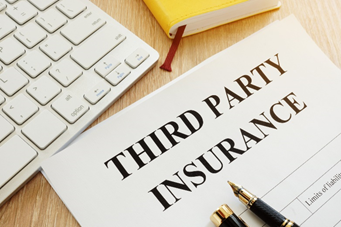What is meant by third party insurance?
Third-party insurance is a policy acquired by the insured from the insurance provider to protect them from claims made by a third party. Third-party insurance is a type of liability insurance. Regardless of the cause of the damages or losses, the first party is responsible for them. Automobile insurance is one of the most common types of third-party insurance.
Summary
- Third-party insurance is a policy acquired by the insured from the insurance provider to protect them from claims made by a third party. Insurance claims in such cases go to the third party.
- Third-party insurance policies come in various forms- a vehicle accident insurance, product liability insurance, professional indemnity insurance and employer liability insurance to name a few.
Frequently Asked Questions (FAQs)
What is meant by insurance?
Insurance is a legal contract between two parties, the insurance company (insurer) and the individual (insured). The insurance company agrees to compensate the insured individual for financial losses (as agreed in the policy) in exchange for premium payments. In simple terms, insurance is a risk transfer mechanism in which the insured entity transfers their risk to an insurance company in exchange for a premium payment done in fixed amounts at pre-decided intervals. Insurance is available for various hazards, ranging from risks to human life, animals and property.
What is the importance of third-party insurance?
Third-party insurance can save businesses from uncertainties that can bring massive financial losses to the business or individual or the insured's family. It acts as a cover against the liabilities that can potentially eat into savings or assets if it were not for a third-party insurance policy. As a result, it is a robust risk management tool employed by entities. While no plans can be made for emergencies, it is possible to have financial backing if one occurs. Third-party insurance policies, like any other policy, are also contributors to the nation’s overall growth.

© Designer491 | Megapixl.com
What are the types of third party insurance?
Third-party insurance policies come in various forms- a vehicle accident insurance, product liability insurance, professional indemnity insurance and employer liability insurance to name a few.
Third-party accident insurance
In case of a vehicle accident, an entity, Mr. A files an accident claim- this is the policyholder or the first party and the insurance company, say XYZ Insurance, is the second party. The other motorist say, Mr. B, who was in the accident, is the third party in this case. If the first party is responsible for the damage caused, then the claim is paid by the second party to the third party in this case. Opposingly, if Mr. B was responsible for the damage, then his insurance company will be liable to pay for the claims made by Mr. A.

Image source © Fouroaks | Megapixl.com
Renter’s insurance
When a property is given on rent, there are two parties involved- the landlord and the tenant. In case there is a landslide in the area, and the whole area is destroyed. In such a case, the insurance policy will cover the house's structure under the policy held by the landlord, but the personal property in the house would be covered under the renter's insurance policy. This policy is essential because otherwise, the tenant will have to bear the loss from their pocket.
Another type of renter’s insurance protects against legal cases that may be filed for physical injury or damage to property caused by the landlord or the landlords family members, or even pets.
Renter's insurance may also provide an additional living expense cover. For example, suppose there is a disaster such that the occupants need to relocate elsewhere for a short while. Then such coverage pays for the expense incurred for living in that place and the living expenses associated with it.
Business liability insurance
Such a policy protects a company against any third-party claims or legal cases. Business liability insurance may be general liability insurance or professional liability insurance, or product liability insurance.
General liability insurance protects against damage caused due to fire, flood, landslide, earthquake or any other catastrophe. In addition, copyright violations, wrong advertising are also covered under general liability insurance.
Manufacturers, wholesalers, distributors, retailers must seek covered under product liability insurance against any legal liability stemming from third-party harm or property damage caused by the consumption or use of the product sold or provided. This insurance coverage protects a company from legal risks by covering the costs associated with them. For example, Johnson and Johnson had to pay compensation to various customers due to the asbestos contamination in its talc-based powder.
Professional liability insurance is also known as professional indemnity insurance. This is a type of liability insurance that protects people from professional risks and associated legal costs. It provides indemnification if a third party suffers an injury, harm, death, or property damage due to the insured's professional service or advice. Access to personal and sensitive data, such as legal details, financials, or intellectual property, may require various consultancy services. Wrong advice, data loss, data misuse (creating trademark or copyright infringement or defamation), or data leakage can result in significant financial losses for clients. Professional liability insurance protects both the consultant and the client from financial losses. The most prevalent grounds for legal action against professionals are negligence or malpractice. Accountants, doctors, lawyers, financial consultants, architects are a few examples of people who take such policies.

Image source © Arturszczybylo | Megapixl.com
An employer's liability insurance policy protects employers if their employees suffer a financial loss. The policy covers only damages relating to employment. For example, if an employee has a heart attack, they cannot prove that the employment caused the heart attack. However, if a manufacturing worker is harmed in a fire caused by a short circuit, the factory owner is responsible for the injured employee's losses.
 Please wait processing your request...
Please wait processing your request...